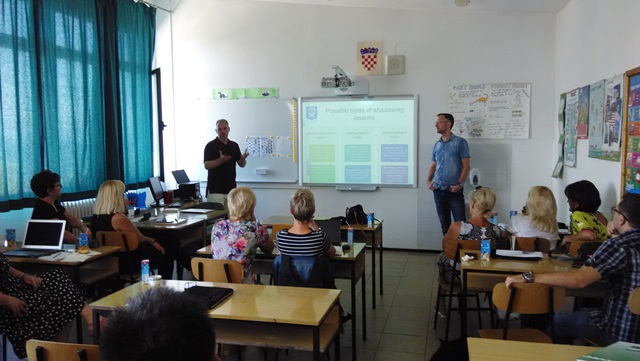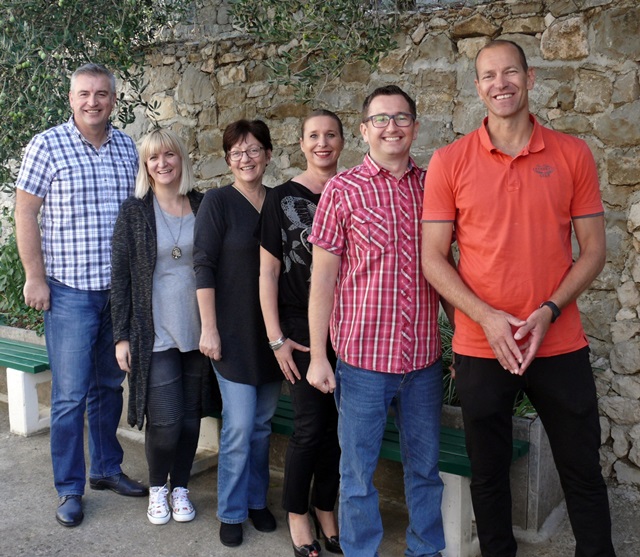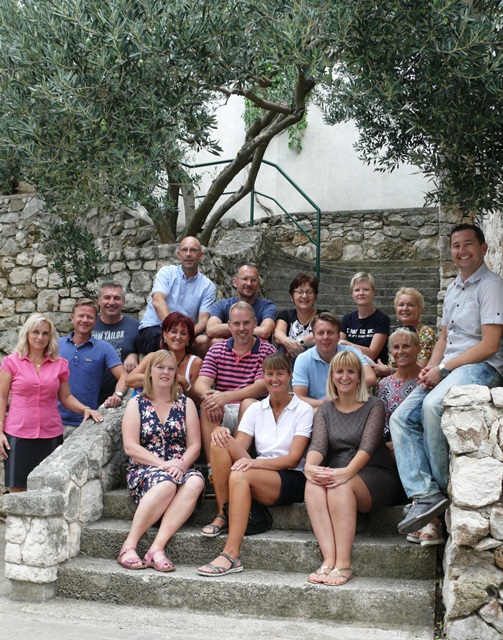ABOUT THE PROJECT
Don Mihovil Pavlinovic School, Podgora, Croatia is a small local primary school with a long history of international projects. We have done two Comenius and Erasmus+ projects with our partners in Kungsgards School from Angelholm, Sweden. The projects' outcomes had a positive impact on us, so we decided to continue our cooperation in the future. This KA1 project is the next step in this long term process. There are two newcomer partners who joined us. They are excellent schools, Dobele State Gymnasium from Dobele, Latvia and Szerencsi Rákóczi Zsigmond Reformed Bilingual Primary School from Szerencs, Hungary. We aim to work together in order to equip out teachers with the best knowledge, key competences, 21st century and transversal skills who will be able to educate and inspire their students. We will work together to make our students successful, autonomous and active citizens of modern Europe.
Our objectives are to improve staff competences, to acquire and implement new, innovative teaching methods and to improve staff ICT competence. We will achieve this by sending teams of 3 to 4 teachers to job shadowing activities in the partner schools and two teachers to structured seminars dealing with the computer assisted learning and new ICT tools. We will shadow our colleagues' lessons, reflect on our impressions and discuss with colleagues, keep daily logs and eventually draft a summary report. Each teacher will disseminate the learning outcomes in our school and in our professional networks. The summary report will be available online for everyone to use it. We will deliver presentations, learning sessions during inset days and workshops. In this way, we will ensure sustainability and transferability of our project.
We have selected six people from our school to participate in mobilities. There is the principal, deputy principal/education counsellor, English teacher /Project coordinator, Geography /History teacher, PE teacher and Croatian teacher. The selection procedure was clear and fair. Everyone was publicly invited to join in. There is a written report about it. The selected staff are volunteers and they are at the same time the bearers of the progress and success in the school. They possess initiative, intrinsic motivation and have participated in the projects before. They are open to gain new skills and competences, to share them with others and are very successful in their work with students. Each will sign an agreement with the school in order to make sure they get familiar with the job shadowing programme and understand their duties and tasks.
Representatives of all partner schools attended a preparatory meeting in Croatia in September 2016. We agreed to do this project together and agreed upon the most important particulars such as job shadowing approximate dates, number of people coming, the tasks and duties of the receiving and sending schools. Each school appointed one point of contact to act as a school coordinator. We exchanged emails. We will have another preparatory meeting in Hungary to pinpoint details and make sure the project goes smoothly. Within our own school, we prepared evaluation tools. The starting point was the questionnaire determining participants' motivation and expectations. After each activity and at the end of the project each participant will again be given a questionnaire. Eventually we will be able to measure the success of the project or correct parts if necessary. Dissemination plan is already in place. Each participant will contribute to this crucial part of our project. The summary report will be compiled using each participant's daily log entries. The learning outcomes will be incorporated into the school curriculum.
After this project is over, we will have teachers who are innovative, who use new teaching methods, who have improved competences and who inspire their students and colleagues. Our school will have a modern and up-to-date curriculum. It will have the European dimension and will be recognized at a wider range. As the ultimate goal, we will have satisfied students, eager to learn, showing autonomy, initiative and creativity.
The world, the times and the people are changing continuously.Therefore, there is a constant need for the education system to adapt and follow those changes. Working on projects like this is our aim and also is the best strategy to keep up to date with the latest progress and developments in teaching methodologies.
Preparatory meeting held in Podgora:

THE OBJECTIVES OF THE PROJECT
The project has three main objectives: to improve staff competences, to acquire and implement new and innovative teaching methods and to improve ICT competences of our staff and students. We intend to meet the objectives attending three job shadowing activities in partner schools in Sweden, Hungary and Latvia and by attending two structured courses dedicated to the improvement of digital competences and computer assisted learning.
Working in the education system for years, the teachers fall into the routine. Unintentionally, they accept certain ways of behaviour, traditional methods and conventional thinking. It is the fact that we do not know any better if we do not see other, better, different ways of teaching and systems. This project is about widening our horizons, opening our minds to innovative teaching methods, trying to think outside the box, learning from different teachers, transferring this knowledge into our school curriculum and wider professional networks, and inspiring our students to acquire learning as something natural. If our task is to teach our students and improve their key competences, transversal and 21st century skills, then it is our first and foremost task to let us learn those. We have to learn in order to teach our students. An international project is much better because we have a chance to abandon our conventional, Croatian routine and learn different ways.
Our partners are excellent and nationally recognized schools with modern equipment, motivated teachers, innovative teaching methods and exceptional results. By visiting them, shadowing their lessons and discussing with their teachers, we will achieve our goals. Our teachers will improve their competences: linguistic, digital, civic, cultural and the others. We will learn about new, up-do-date strategies and teaching methods. We will include the European dimension into our school curriculum and internationalize our school.
Teachers from our school have regular meetings where they discuss outstanding issues. By reflecting on the current situation in our school and students' mild motivation to learn the conventional way, we identified the need to change teaching methods. On a regular basis, we have self-evaluation process among teachers, students and parents. Analysing those results, we have also concluded that there is a need to implement innovative teaching methods. Having participated in Comenius and Erasmus+ project partnerships, we witnessed great excitement and high motivation in our students while undergoing project-based and inquiry-based learning. This was established to be the right strategy for the school development and higher quality.
The fact that our school was chosen to join eŠkole national project, mean that our teachers need to improve their ICT skills. This project, job shadowings and structured courses will give us the opportunity to achieve this goal.
The selected teachers are at the same time those who are the leaders of school's progress, innovation, change and improvement in our school. They are open and motivated to learn new skills and competences, to implement new teaching methods. They are dedicated to sharing their knowledge with others and incorporating it in the school curriculum.
Participating teachers:

LEARNING OUTCOMES
fter the job shadowing activities, the participants will:
- improve intercultural competences and European awareness;
- improve linguistic skills;
- improve basic competence in science and technology;
- improve digital competence;
- enhance cultural empathy;
- acquire modern and innovative teaching methods and techniques;
- learn how to apply project-based teaching, cros-curricular, inquiry-based teaching;
- improve project management and evaluation skills;
- improve their own motivation and refresh interest in the subject they teach;
- refresh their own knowledge;
- improve their creativity;
- improve their collaboration skills;
- improve ability to provide challenging and inclusive activities for all students;
After the professional trainings, the participants will:
- know how to integrate ICT tools into the school curriculum;
- improve their ICT skills;
- be able to use new and innovative teaching tools;
- learn about the latest developments in computer assisted learning (CAL) and technology enhanced learning (TEL);
The students will not be included into mobilities but as recipients will improve:
- European awareness;
- intercultural competence and empathy;
- linguistic competence;
- Intercultural communication and the ability to think about others who aren't like us;
- critical thinking and problem solving skills;
- cross-curricular and inquiry-based learning;
- ICT skills
Preparatory meeting held in Podgora:
